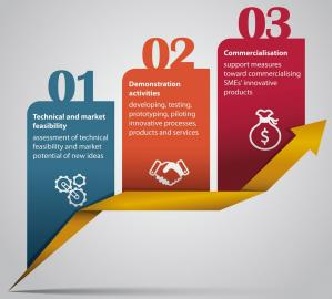 newsitems
newsitems  Russian Duma Chief Nashyrkin tests EuroFora idea on Citizen-MP Debate before Decision,+Coop.CoE/WFD+
Russian Duma Chief Nashyrkin tests EuroFora idea on Citizen-MP Debate before Decision,+Coop.CoE/WFD+
Russian Duma Chief Nashyrkin tests EuroFora idea on Citizen-MP Debate before Decision,+Coop.CoE/WFD+
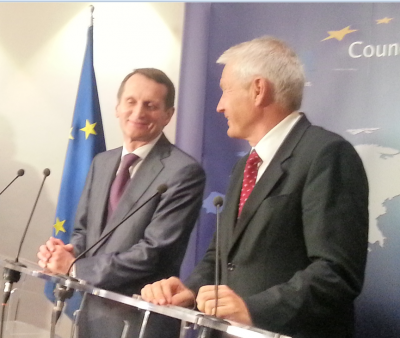
*Strasbourg/CoE/Angelo Marcopolo/- Speaking to Journalists at the CoE, including "EuroFora", Russian Parliament's President, Sergey Naryshkin, after a landmark Speech at CoE's PanEuropean Assembly, presented a new 2012-2014 Project to develop "E-Democracy" in real practice, coherent with "EuroFora" Founders' 1997-2007+ main idea to boost active participation of Citizens in Public Debates during the Decision-making process of Measures affecting People's lives, by adequate use of Internet and Compuiter Technologies, (Comp. "EuroFora"s basic, introductory texts, and "EIW" collective project officially registered by EU Commission in Brussels as early as since 1997, in the framework of a tender for the "ESPRIT" programme for innovative social uses of New Information and Communication Technologies).
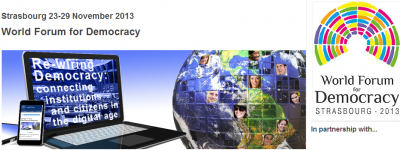
Timely, President Naryshkin's move was made in Strasbourg, almost at the eve of CoE's 2013 Annual "World Forum for Democracy", scheduled for November, which is, for the 1st time, dedicated, precisely into "Re-wiring Democracy" by "connecting institutions and citizens in the digital age", according to its official sub-titles, aiming to look into opportunites and risks of a number of Participatory Initiatives, test their solidity and longevity, in an open debate with elected politicians, according to CoE's official anouncement. Meanwhile, the concrete points of the Russian Initiative were presented during a special Event organized this week at the CoE (See Infra).
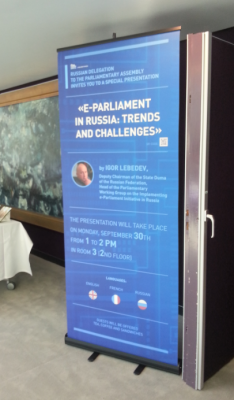
+ Pointing also at "the growing Responsibility that has been bestowed on European Parliaments", as clearly indicate the "Dramatic Moments of our History" that we are living Today, f.ex. vis a vis "events on Syria", (including the famous Brittish Parliament's Vote, which recently forbidded Air Strikes against Syria), which highlight that Threats to the World Order are related to Defiance of the Law and Principles which were founded here, on the European Cointinent , at the aftermath of 2 World Wars, during which, the Centuries-old European commitment to Humanist Values that unfderpin Legal Systems, had been bypassed by Crimes against Humanity, frrom the Armenian Genocide and the Horrors of the 1st World War, up to the NAZIsm and the 2nd World War, Naryshkin stressed, earlier, speaking to MEPs, that "People around the Worls are following the events in Europe, because it was on European soil that the Great Discoiveries and Technological Breajthroughs were made, and Legal or Socio-Political Theories emerged, leading to Progress, Freedom and Dignity of Human Life".
--------------------------------------
- In general, I thought that this was the Time for Ideas to be Heard, and to be Positively received, and, indeed, during my Meetings with CoE Parliamentary Assembly's Presiden Jean-Claude Mignon, and CoE's Secretary General Thorbjorn Jagland, as well as during my Speech, earlier to MEPs, I saw that the Issues that I raised, are clearly Understood, and sometimes Appreciated, even if "we also looked at various areas that Need Improvement", the Russian Duma's President told Journalists, including "EuroFora", at the conclusion of his Strasbourg's visit.
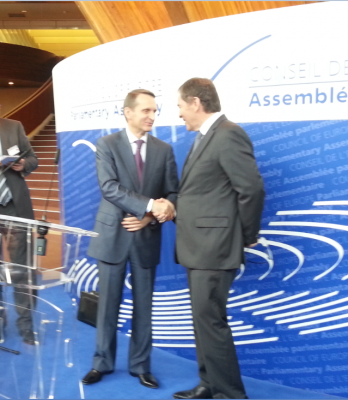
Asked what kind of Ideas had he tried to convey here, Presiden Naryshkin recalled that, during my intervention, at CoE's Paneuropean Parliamentary Assembly (PACE), I also spoke about the Challenges raised Today", (which included also the "E-Democracy" Project of the Duma), We (Russia) value the activities of the CoE and of its Parliamentary Assembly. We believe "that these are very Important ...Institutions, which are Beneficial for our Cooperation, and deal with Democracy". Thus, "there is No Doubt about the Fact that, while we are developing this .. we will also be Focusing on .... to Challenges and Issues, that we have to solve in the process of these, very demanding activities", as he said; shortly after having previously presented "E-Democracy", precisely, as one of these "Challenges".
=> Therefore, "out visit will Move Forward" some "very Important Issues", that we discussed while looking ahead. Thete is no doubt that in such Important issues, we can Work Further", and that, therefore, we can Accomplish much more. Because, "Today, the situation is Changing", and "we are facing the New Issues, (such as "Syria", "E-Democracy", etc), and "we are looking at .. Open Talks, and for Discussing the System of Law that exists Today, (including also) of International Organizations, .. of Global Politics, (etc). Therefore, the role of the Parliamentary Assembly of the CoE, of all those forces that are working in this area, becomes so great, that, this was the Time to come" to Strasbourg, he explained. In consequence, out meetings are a good demonstration of (the fact) that our Parliamentary Cooperation, and the Role of the CoE, will Expand", anounced the President of the Russian Parliament to Strasbourg's Journalists, including "EuroFora",
After PACE's President Jean-Claude Mignon, also COE's Secretary General, Thornbjorn Jagland told us that, during what he qualified as "a very Constructive meeting" with Naryshkin, "we have Started to Discuss various Projects of Cooperation, between the CoE and the Russian Federation", "on various matters", and, "all in all, I would like to say that Cooperation ....is on a very Good track" , as he concluded.
--------------
In particular, convinced that Parliamentary Democracy, which emerged in Europe Thousands of Years ago, is playing an increasingly Important role in Today's World, President Naryshkin expressed his belief that Representative Democracy is a Time-tested and Necessary Institution, also for the functioning of Modern States.
However, one of the Main Challenges which determine both our Mutual Undestanding, throughout all the Continent of the Great Europe, but also the content of our Agenda, as he stressed, is the fact that the Modern Legislative Process canNot be, no more, conducted behind Closed Doors, its Access cac no longer be confined to the "chosen Few", he warned.
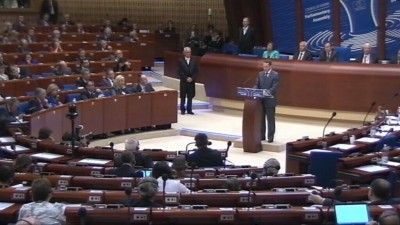
>>> On the contrary, Today, not only "this process should be made Transparent to the Public", but, evenmore, "it should be subjected to Dialogue, throughout the Deliberation" , stressed, earier in his Speech to CoE's Assembly, President Narushkin, pointing at the various Legal Draft Bills (tabled by MPs or by the Government) and/or Initiatives (lodged by Citizens, almost like the EU Citizens' initiative, introduced by EU Lisbon Treaty after 2010, but existing in a much Simpler way in the Duma, as Russian sources confirmed earlier to "EuroFora").
Experience teaches us, f.ex., that "it is often the Lack of Feedback, of Dialogue, that makes People Question the Legitimacy of Government Decisions, and the Fairness of Courts' rulings, he observed.
But, Today, some Internet portails inculcate People with the idea of Individual Freedom, which, in fact means to depend only on the Law, as the Historic French Philosopher of the Enlightnement, Voltaire had hghlighted, while New Communication Technologies have more and more an Important Influence on our Political Agenda, when we are faced with the Challenge of a Virtual World, with its own Public Opinion Techniques, transcending National Borders, and built in parallel with Traditional Parliamentary and other Institutions of Democracy, by forming many Interest Groups and popular Debate Forums, noted Naryshkin.
Even if some People consider that the development of the Internet Age would signify the Demise of Classic Parliamentary Democracy, since Social Networks are considered to be now a mouthpiece of the People, with undoubted Influence.
But, on the contrary, I believe that, in such circonstances, the Responsibility of Parliaments has become even more Important, Russian Duma's President stressed.
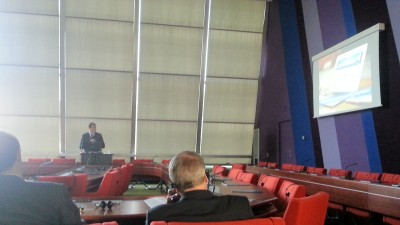
=> Because this new trend seems likely to continue unfolding, until, sometimes in the Future, "New, Electronic Democracy" realities emerge, with its own Procedures and Legal Forms, Narushkin foresaw.
However, in the meantime, thy have to pass the Test of the Time, and be proven Error-Free, in order to avoid any eventual risk to the detriment of future generations, he warned.
Obviously, that's one more reason for which the Russian Duma has recenty taken the decision to start experimenting and even systematically using in real practice, such Internet-facilitated EU Citizens' involvement in timely Dialogues with MPs and Governments before decisions which affect their lives are taken, while also it is interested into developing exchanges of views, and/or common projects with various other, National, Regional or International Parliamentary Organisations, as Serguey Narushkin suggested, pointing at Inter-Parliamentaruy cooperation, Scientific Research in Law and Politics etc.,, Socio-Political Experimentation and/or Theorisation, etc.
--------------------
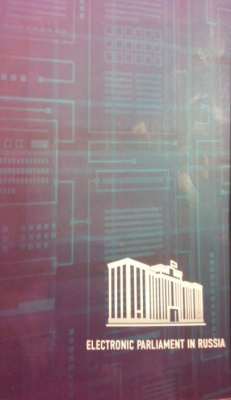
In fact, the "e-Democracy" Project, supported by the Russian Government, started with the newly-elected Duma from 2012, with a 1st Implementation stage in 2013, and the aim to have completed most of its parts by the end of 2014.
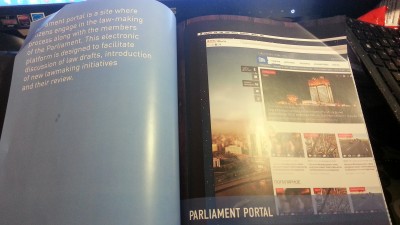
Citizens can not only know what Measures are prepared in the Parliament, and follow them, from the 1st Reading of a Draft Bill, throughout all the Decision-Making Process, up to Final Adoption, but they can also Participate Actively, by raising relevant Questions to MPs and receiving their Answers, by eventually suggesting Amendments which can be taken partly or entirely into account and officially tabled by MPs, by presenting "Initiatives" which can be Voted On-line, and eventually accepted, in all or in part, in order to form New Draft Bills, as well as by joining Public Forums of Discussion, dedicated to one or another Draft Bill, which are to be maintained by each Parliamentary Committee competent for the discussed Draft Bill, as Duma's competent Officials told previously "EuroFora", after a special presentation for MPs, PACE Officials and Journalists organised at the CoE by Duma's vice-President Lebedev.
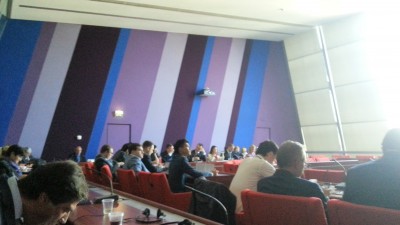
------------------------------------------------------------------
Well informed Russian sources close to the President of the Duma, indicated to "EuroFora" that, in fact, such an idea of Debates between Citizens and Political Decision-making bodies before important measures affecting their lives are taken, apparently reminds also an Ancient Russian custom, which woud have eventually emerged, in different forms, already as early as after the 12th Century AC, (i.e. basically after the Brittish "Bill of Rights", etc). I.e. probably at the begining of the Historic emergence in Europe of a kind of "Public space" (German Political Philosophe Jurgen Habermas' "Öffentlichkeit"), as if its main substance was, right from the start, embedded inside what became, later-on, the Public Adinistration in itself, as "EuroFora"'s co-Founder had discovered in the framework of a Scientific Research on Administrative Law in Europe.
(../..)
***
(NDLR : "DraftNews", as already sent, earlier, to "EuroFora"s Subscribers/Donors. A more accurate, full Final Version, might be published asap).
***
Main Menu
Home Press Deontology/Ethics 2009 Innovation Year EU endorses EuroFora's idea Multi-Lingual FORUM Subscribers/Donors FAQs Advanced search EuroFora supports Seabird newsitems In Brief European Headquarters' MAPs CoE Journalists Protection PlatformBRIEF NEWS
- 00:00 - 02.06.2021
- 00:00 - 18.10.2020
- 00:00 - 19.06.2020
- 00:00 - 18.05.2020
- 00:00 - 20.04.2020
- 00:00 - 02.02.2020
- 00:00 - 09.12.2019
- 00:00 - 27.11.2019
- 00:00 - 16.11.2019
Popular
- Yes, we could have prevented Ferguson riots says World Democracy Forum's Young American NGO to ERFRA
- Spanish People Elect CenterRIGHT Majority with 1st Party and Total of 178 MPs (6 More than the Left)
- Pflimlin's vision
- The European Athletic "Dream Team", after Barcelona 2010 Sport Championship Results
- Source Conseil d'Europe à ERFRA: Debatre Liberté d'Opposants à Loi livrant Mariage+Enfants à Homos ?
- Head of BioEthics InterGroup, MEP Peter Liese : "Embryonic stem cell research reaching its END" !?
- Spain: Jailed Turkish Terror suspect with Explosive,Drones,Chechen accomplices stirs Merah+ Burgas ?
- UN Head Ban Ki Moon at CoE World Democracy Forum : - "Listen to the People !"
Latest News
- Test Photos (f.ex.+ Invit to EU + Korea Peace meeting)
- EUOmbudsmen Conference 2022: Digital Gaps affect People's Trust threaten EF Project on EU Future ?
- French Election : Black Out on Virus, but Obligation for Fake 'Vaccines" Challenged
- Both French Presidential Candidates point at "Humanism" in crucial times...
- France : Zemmour = Outsider may become Game Changer in Presidential + Parliamentary Elections 2022
Statistics
Visitors: 59747206Archive
Login Form
Other Menu
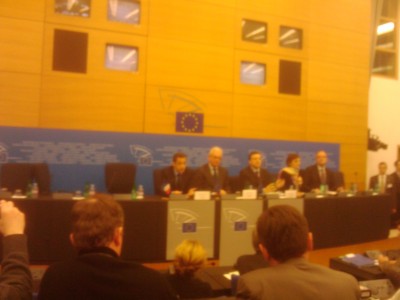
Recent developments proved that Europe can suceed to overcome challenges by aiming at great objectives, and this is needed also in 2009, said EU chairman, French President Nicolas Sarkozy.
- "It's in the name of Great Ideas, Projects, Ambition and Ideals, that EU can overcome" challenges, stressed Sarkozy at EU Parliament in Strasbourg, in conclusion of a dense 7 months EU Chairmanship. "It's even easier for Europe to have Great projects, able to overcome national egoism, instead of limiting itself only to small projects" (unable to do alike), he observed.
- "Europe must remain Ambitious and understand that the World needs her to take Decisions". "The World needs a Strong Europe", which "thinks on its own, has convictions, its own responses, its imagination" : "A Europe which does not limit itself into following" others, (as it did in the Past, when it followed USA, f.ex. on Bosnia). On the contrary, "Europe should undertake its own responsibilities", he said, after a series of succes in stopping the War between Russia and Georgia, and organizing the 1st EuroZone's Summit in Paris, which incited the Washington DC G-20 Summit to extend similar decisions World-wide.
- "When you sweep it all under the carpet, prepare yourself for hard tomorrows", he warned. "What hinders decisions is the lack of Courage and Will, the fading away of Ideals", he stressed before EU Parliament's 2008 debate on Human Rights and Sakharov prize on Freedom of thought attributed by MEPs to Chinese cyber-dissident Hu Jia, followed by an EU - Turkey meeting on Friday.
- "I don't abandon my convictions" and "I will take initiatives" on EU level also in 2009, Sarkozy announced later. "France will not stop having convictions and taking initiatives" on Europe. + "It's an Error to wish to pass over the Heads of those who are elected in their Countries" : "It's an integrism I always fought against"', he warned.
---------------------
French EU Presidency faced 4 unexpected Crisis :
- An institutional crisis, with the Irish "No" to EU Lisbon Treaty, just before it started. A geopolitical crisis, wth the threat of War between Russia and Georgia risking to throw Europe back to Cold-war divisions, on August. A World-wide Financial and Economic crisis, arriving at a bad moment before crucial 2009 EU elections. And even a Strasbourg's mini-crisis, with EU Parliament's roof curiously falling down, from unknown reasons, in a brand new building on August, provoking an unprecedented transfert of the 2 September Plenary Sessions...
But it wasn't enough to stop Sarkozy ! On the contrary, it stimulated him...
---------------------------------------
- "The better way to deal with the recent problems of EU institutions (as the "3 NO" by France, the Netherlands and Ireland) is to take them as a "Test" in order to find solutions closer to Citizens' concerns", said later in Strasbourg Sarkozy's new choice as Ministe for EU affairs, Bruno Le Maire.
- On the Institutional front, Sarkozy gave Time to the Irish to think about it, and stroke on December a deal including a New Referendum after the June 2009 EU Elections, in exchange of a promise to keep the rule of "one EU Commissioner for each EU Member Country", and some opt-outs on Defence and Fiscal EU policies, Abortion, etc. If the Irish get a "Yes" Majority, then the institutional package could be completed in 2010 or 2011 on the occasion of Croatia's probable EU accession.
He was accused in Strasbourg to upgrade EU Council and downgrade EU Commision, but he replied that "strong Political initiatives by EU Council reinforce also the more technical role of EU Commission, under the political-technical leadership of its President", all 3 "working together with EU Parliament".
- But, meanwhile, Sarkozy energetically spearheaded an Historic 1st Summit of EuroZone's 15 Heads of State and Government at EU's core, exceptionally enlarged to a partial participation of British Prime Minister Gordon Brown, on October 12 in Paris' Elysee palace, which started to tackle succesfully the growing world Financial crisis.
It also paved the way for its endorsement by a subsequent Brussels' 27 EU Member States' gathering, before it all come to Washington's G-20 Summit. And "Europe was united, it asked for the 1st G-20 Summit, and it will also organise the next G-20 Summit on April in London", he observed.
But a Conference with EU, Russia, African and other Developing Countries, hosted in Strasbourg shortly after Washington G-20 Summit by the French EU Presidency, took a Resolution asking to enlarge participation to Global Economic Governance. Many found, indeed, illogic and unacceptable that f.ex. states as Turkey were given a seat at G-20 level, while all African Countries, and even the African Union itself, representing the greatest Continent on Earth, were excluded...
Meanwhile, even USA''s "Paulson No 3" Plan, was, in fact, inspired by Europe's No 1 Plan", Sarkozy observed, largelly applauded by MEPs.
And "Europe showed Solidarity" by mobilizing some 22 Billion credit for Hungary, 1,7 billion for Ukraine, as we do nowadays for Baltic States, etc., he added.
The move on Economy was extended on December by an EU stimulus' plan totalling some 200 billion Euros, including 5 Billions released by EU Commission for big Projects, as well as various parallel National plans for Economic revival, (fex. 26 billions in France alone). They might appear limited, compared to USA President-elect Obama's reported plan to boost the American economy with 800 billion $, but at least succeded to overcome Europe's divisions for the first time on Economic governance, opening new horizons.
- The French President stressed even harder the unique role of an active EU Council's chairmanship, when he moved swiftly and efficiently, at the beginning of August, to succesfully stop War between Russia and Georgia, at the last minute, which threatened to bring Europe back to Cold War division.
"We (EU) also wanted to avoid a situation like in Bosnia, in the Past, when EU was absent, so that our American friends took their responsibilitues, and EU only followed", despite the fact that the conflict took place in Europe. Now, it was the EU who took its responsibilities".
A roadmap towards a new PanEuropean Security policy, before which all unilateral moves to place new Missiles (from USA or Russia) would be freezed, was proposed by Sarkozy after a meeting with Russian president Medvedev, at the eve of Washington DC's G-20 Summit.
Ukraine's "European" character was stressed at a Sarkozy - Jushenko Summit, September in Paris, while EU adopted on December an "Eastern policy", in which, "I'm convinced that our (EU's) future is to find with our Neighbours the conditions for Economic Development. Peace and Security, by explaining them that.. they must respect (Human Rights') Values, and adopt behaviors different from the Past", explained Sarkozy in Strasbourg.
Meanwhile, the "Union for the Mediterranean" was created, since July's Summit if 45 Heads of State and Government in Paris, as "an organisation for a permanent Dialogue, that we need", mainly in order to tackle the Israeli-Palestinian conflict, by bringing together, for the 1st time, Israelis and Arabs, where "Europe must be present, in order to avoid a frontal clash".
- "If Europe doesn't take its part for Peace in the Middle-East, nobody else will do that in our place", Sarkozy stressed.
-----------------------
Meanwhile, other EU Agreements were brokered during the French EU Presidency on Immigration, (fex. common Asylum rules, etc), and Climat- Energy :
- On Climat-Energy, the 2007 German EU Presidency had fixed a triple 20% aim for 2020 (20% renewable Energies, 20% reduction of CO2 emmission, 20% energy efficience/economies), and the 2008 French EU Presidecny realized that, making the necessary compromises in order to modernize EU's industry, but without throwing some former Central-Eastern European Countries into abrupt Economic break down risking "social explosion".
- Defence-Security EU policy was mainly postponed for April 2009, since both German chancellor Merkel and French president Sarkozy want to strike a deal with the new American president Obama in Strasbourg's NATO Summit.
However, with all these 4 unexpected Crisis diverting attention to other urgencies, People wil wonder now, what happened to the famous deal proposed by freshly-elected French President Sarkozy on Turkey's controversial EU bid, back on August 2007, to continue EU - Turkey negotiations, but on the double condition that core chapters, intrinsequally linked with EU Membership, will be excluded, and that a collective Reflexion and Debate on Europe's future would start before the end of 2008.
It was meant to reply to the crucial question : What kind of Europe do we want in 10 or 20 Years from now : A large Market, or a Political Europe, with a popular identity ? In Sarkozy's thinking, presented in his 2 landmark speeches on Europe in Strasbourg, shortly before and after the 2007 Elections, (on February and July 2007), Turkey's controversial EU bid would be incompatible with the second choice.
It's true that EU Commision's Chairman, Jose Barroso, (who had notoriously declared, as former Portuguese Prime Minister, that he found "nonsense" the idea that Europe might become equal to the US), had repeatedly tried to avoid that Sarkozy's criticism on Turkey might start winning a larger audience in Europe, preferring a discrete "wismens' committee" work. And that most of the personalities later chosen in order to participate in a Committee on Europe's Future, are too much linked with Socialist parties and/or American policies, to be really critical of USA's notorious wish to impose Turkey to the EU, as Sarkozy had noted himself since March 2007..
- "It's on EU Council's presidency to take political initiatives. EU Commission has other competences", stressed Sarkozy. The "European Ideal" is to "build Europe with the States, not against them". "Ask Europeans to chose between their countries and Europe won't work. You don't choose between your two parents : We must add them together".
"France and Germany have an Historic Duty to work together, precisely because of what happened to the Past. We have to work hand by hand. We cannot be separated.It goes beyond me and Mrs Merkel today, Mr Schroeder and Mr. Chirac yesterday. It's not a choice, it's a duty to Europe and to the World". "We need Germany, as Germany needs Europe". Compromise is inevitable, here as everywhere, and each one made some steps towards eachother's positions.
But "it's true that Mrs Merkel didn't chose her Socialist partners, while I chose mine", Sarkozy said, in an indirect hint that the Socialist Minister of Finance in Germany might be a cause of minor past disagreements in Economy, which were overcome in recent negotiations.
"We (France and Germany) have particular duties in Europe", but "in a Europe of 27 Member States, it's not enough for France and Germany to agree between them.
"I always thought that Great Britain has a special role to play in Europe. ... Now, everybody "saw what it cost payed the UK for having been too exclusively open towards the US (and) Financial services. Europe needs the UK, but also the UK needs Europe" :- "We were able to face the hardest moment of the Financial crisis because the UK clearly chose Europe", stressed Sarkozy, reminding Gordon Brown's exceptional participation to the Historic 1st Heads of State/Government Summit of EuroZone, October 12 in Paris (See EuroFora's Reportage from Elysee Palace then).
- "Some look at Europe with old glasses aged 30 years ago. While we must look at her in relation to what it will be in 30 years" in the Future, Sarkozy concluded.













